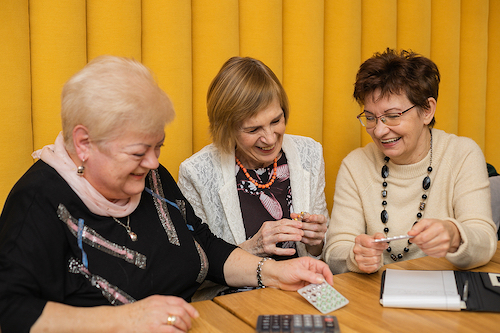January 31, 2023
by Elizabeth Pratt
 Receiving support from others could help ease the impact from genetic risk for depression.
Receiving support from others could help ease the impact from genetic risk for depression.
Researchers from the University of Michigan found that individuals with a high genetic risk for developing depression most benefit from a nurturing social environment.
“We found that people who were most at-risk for depression based on their genes did develop depression at higher rates than other people when they lost social support, but if they gained social support, they had the lowest rates of depression out of anyone. Basically, the most at-risk people genetically did the worst in negative social environments but the best in positive social environments,” Jennifer Cleary, M.S., first author of the study and a psychology doctoral student at U-M who is doing her research with senior author Srijan Sen, M.D., Ph.D., of the U-M Medical School.
In undertaking their study, the researchers used data from the Intern Health Study and the Health and Retirement Study.
They collected data from 1011 first year medical residents (interns) and from 435 people who were recently widowed. Nearly half the interns were female and 71% of the recently widowed people were women.
Among the interns, depressive symptoms had a dramatic increase (126%) during their intern year of training. This included working long and irregular hours and often involved being far from family and friends.
Among the widows and widowers, there was an increase of 34% in depressive symptoms compared with their stress levels prior to being widowed.
The researchers say this reinforces past research which found that losing a spouse can be among the greatest stressors in a person’s life.
Once the researchers had this data, they then factored in each individual’s polygenic risk score for depression. This is based on what small variations in certain genes are linked to depression risk.
They also factored in responses from participants about their connection with family or friends, or other forms of social support.
Many interns reported losing social support during their intern year. The researchers found that the interns who had the highest polygenic risk score for depression who also reported losing social support had the highest levels of depressive symptoms.
However, those with the same polygenic risk score for depression who gained social support during this period experienced much lower levels of depression symptoms. The researchers found these symptoms were even lower than those without a high genetic risk for depression.
By comparison, some who had been recently widowed reported an increase in social support after their spouse died.
Among those who were recently widowed, those who had a high polygenic risk score for depression but who gained social support following the death of their spouse showed a smaller increase in symptoms of depression compared with those with a similar polygenic score but who lost social support.
“Social support is important, especially when someone’s going through a stressor that might limit their ability to connect with friends and family. Also, our genes that make us more likely to develop depression when we don’t have enough social support also benefits us by being more responsive to positive environments,” Clearly said.
“Genetic studies show depression is about 40% heritable, and works in a similar way to something like height- the same way there’s not one “tall” gene, it’s not any single gene that causes depression. Our study also adds to the literature suggesting that genetics in combination with environmental factors are most influential.”
The researchers say their work reinforces the importance of reaching out to others when going through a hard time, or connecting with those who are having difficulties of their own.
They say that connecting with others can have benefits not only for the person who is experiencing stress and hardship, but also for the person who reached out to support them.
“Social support is very important and particularly helpful for the people most at risk. The pandemic shifted all of our social environments and both highlighted how much we thrive on social support and opened up new ways for us to connect virtually. More broadly, different types of interventions can be helpful to different people and social support is just one potential way of helping anyone going through a stressful situation.”
About the Author
 Elizabeth Pratt
Elizabeth Pratt
Elizabeth Pratt is a medical journalist and producer. Her work has appeared on Healthline, The Huffington Post, Fox News, The Australian Broadcasting Corporation, The Sydney Morning Herald, News.com.au, Escape, The Cusp and Skyscanner. You can read more of her articles here. Or learn more about Elizabeth and contact her via her LinkedIn and Twitter profiles.